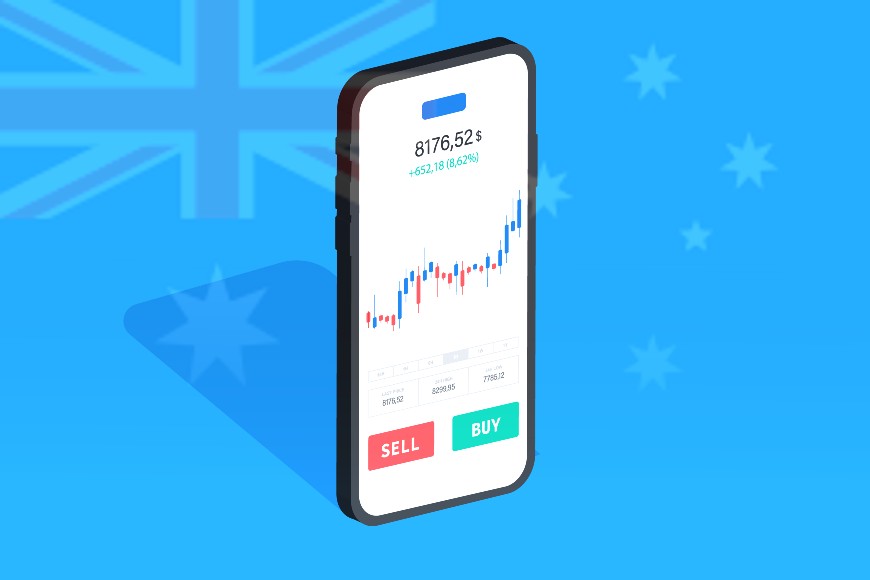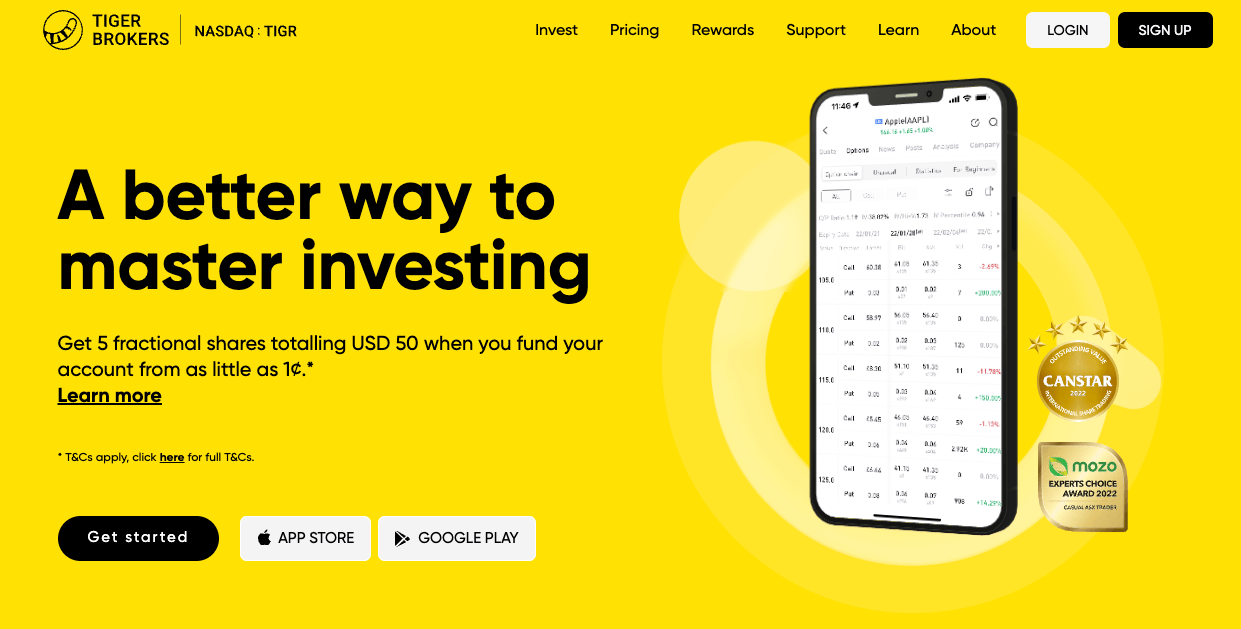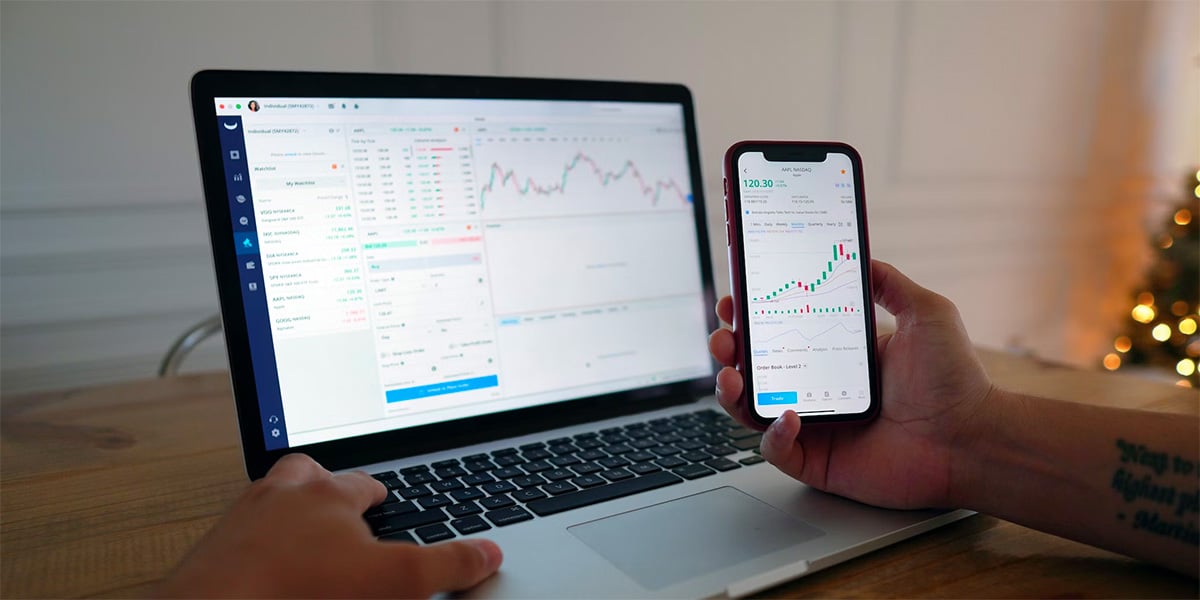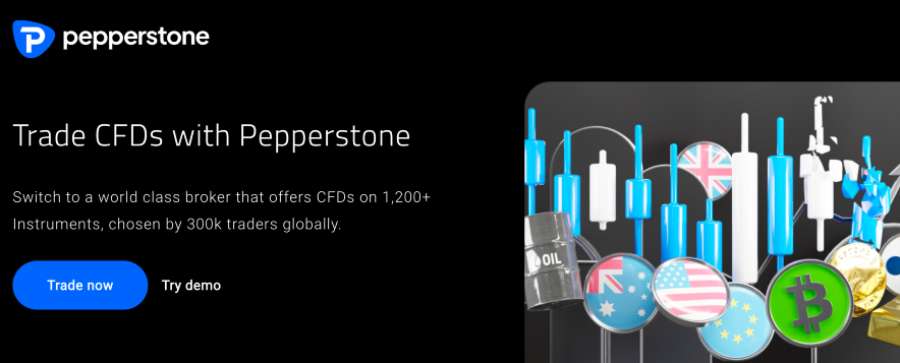Australian residents have access to some of the largest exchanges in the world, providing access to trade stocks, funds, derivatives and more. However, failure to find the best platform can result in high trading costs and limited access to markets.
After countless hours of research, my guide has identified the best trading platforms available in Australia taking into account assets, tools, education, and fees among other variables.
5 Best Online Providers Australia at a glance
Discover the best online brokers in Australia
In my list below, I give an overview of the best online brokers in Australia.
Plus500 - CFD Trading Platform: Suitable for stock CFDs and trading tools
 Note: Image Shows Illustrative Prices
Note: Image Shows Illustrative Prices
Plus500's CFD trading platform includes access to their advanced analytical tool, Insights, via their trading app. They also offer 2 further tools, Instrument +Insights tab and +Me.
Instrument +Insights tab is an instrument-focused experience that lets users dive deeper into each instrument's data
+Me is your trading insights compared to real Plus500 traders. Keep track of what you trade most or how often you use risk management tools and compare it with other Plus500 traders.
This comes free of charge and can arm traders with useful analysis of millions of trades in real-time . This allows you to harness trader sentiment to help with your trading decisions, including the highest-yielding trades.
This can also work out as a really low-cost option with tight spreads and commission free trading.
CFD service. Your capital is at risk
AvaTrade: Best for educational content
AvaTrade is not your average forex broker. Sure, they may have very similar offerings to eToro, IG, and Pepperstone in that they’ve got forex functions and copy trading capabilities, but what makes them stand out is their educational content.
AvaTrade’s platform offers tons of webinars, video tutorials, and eBooks to help traders improve their forex skills and get started on their trading journey. This is perfect for newbies who are still figuring things out. Plus, they’ve got a demo account so that users can practice trading without risking any real funds.
What’s more, AvaTrade also comes with a bunch of trading tools and features that are designed to help users make smart trades. They’ve got stop-losses and take-profit orders. This way, users can minimise risk while maximising profits.
Not only that, AvaTrade also offers technical analysis indicators and charting tools to help users analyse market trends and make informed decisions. All this on top of the copy trading function makes AvaTrade an excellent platform to trade on.
Capital at risk.
eToro: Best for copy trading beginners

eToro is one of the largest global online trading platforms available. The platform offers users an intuitive platform that is relatively easy to use, and is highly regulated in most countries.
There is absolutely no commission charged on the purchase of shares and no deposit or monthly account fees, though you will be required to make a minimum deposit of $50 when you first open your account.
Despite having no commission on trades, eToro does typically charge for forex and derivative trading, though the cost is usually built into the spread. If you are planning on trading either forex or derivatives, it may be worth comparing the different spreads on offer before investing.
Also, there is an inactivity fee with eToro – you will be charged $10 every month after 12 months of inactivity.
Stocks via eToro Service ARSN 637 489 466 Capital at risk. See PDS and TMD
Copytrading allows you to ‘copy’ or ‘follow’ others. Assets held in your name, including OTC Derivatives (leveraged financial products) and crypto assets (unregulated). Past performance not an indicator of future results.
Pepperstone: Best for share CFDs and Spread Bets
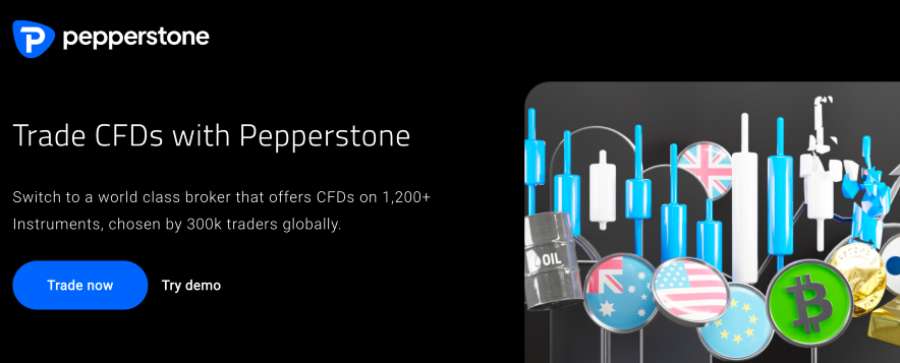
CFD trading and Spread Bets offer a simplified way to short-sell stock whilst using leverage in order to maximise your gains. This means you can profit from falling stock prices, unlike traditional stock trading where you rely solely on the price of your stocks going up in value. With CFD trading you are speculating on whether the price of a particular stock will rise or fall without ever owning the underlying asset.
Please remember that CFD trading and Spread Betting are both risky strategies and you could end up losing more than you originally staked.
The Pepperstone stock trading app provides access to 24-hour trading and in addition, you can trade in AUD in order to eliminate currency risk.
It’s important to point out that at Pepperstone you can engage in CFD trading and Spread Bets using leverage on the MetaTrader 5 trading platform which makes this a more appropriate option for experienced traders.
However, you will find lightning-quick execution times, the option to hedge, advanced pending orders, and a plethora of other tools and features to help elevate your trading.
Tiger Brokers: Best forAustralian Stocks
Tiger Brokers was founded in 2014 and has risen to be listed on NASDAQ. They are highly technology focussed with over a million users worldwide and focus on a single account rather than multiple accounts for different reasons.
Within the single account, investors access assets like securities, ETFs, futures, options and funds. Users can also trade shares on the Australian Stock Exchange amongst others.
Its own proprietary trading platform called Tiger Trade allows users to analyze and trade with real time data on desktop or using the mobile app that is available for both iOS and Android.
Tiger Brokers also offers a customizable dashboard, allowing users to personalize their trading experience.
Interactive Brokers: Best for range of markets
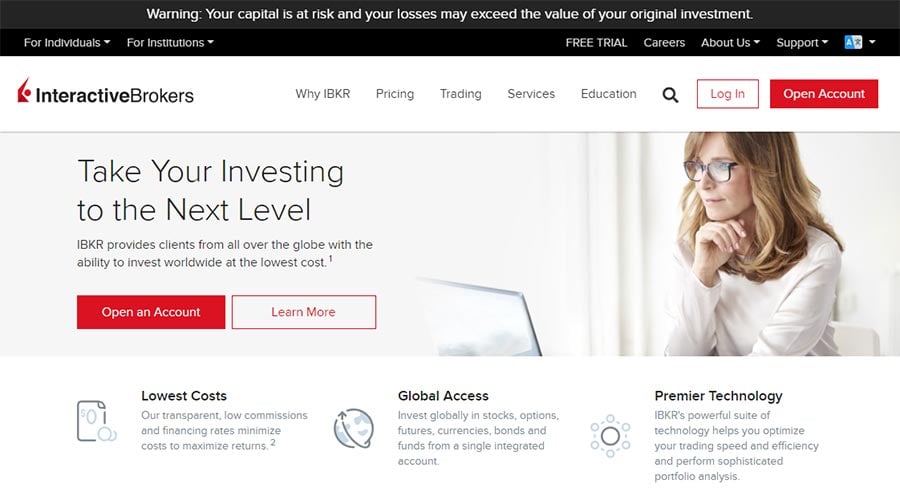
Interactive Brokers is yet another online trading platform you can use in Australia. This popular broker gives users access to more than 135 global markets across 33 different nations.
As well as stocks and shares, Interactive Brokers allows users to invest in funds, such as ETFs and investment trusts, as well as trade derivatives, such as CFDs or spread bets.
There is commission charged on trades when you use Interactive Brokers, though the exact charge will depend on the international markets you’re trading on. For example, investments in US markets could see you paying a fixed $0.005 commission, while Canadian markets require a fixed $0.10 commission.
When you first open an account with Interactive Brokers, you won’t be required to make a minimum deposit, and there are no inactivity fees whatsoever.
Capital at risk.
Saxo: Best for web platform
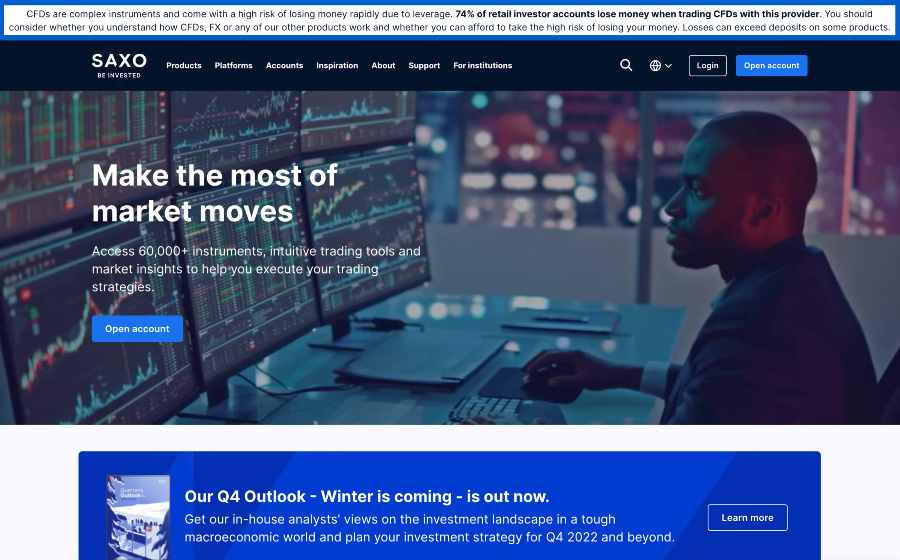
Another online broker that’s available in Australia is Saxo. The platform is operated and regulated by a Danish bank, though the platform itself gives you access to a wide range of markets.
There are no withdrawal fees when you use Saxo, though you will be charged $150 after six months of inactivity. Also, when you first open your account, Saxo requires you to make a $500 deposit.
Despite these relatively high non-trading fees, the trading fees on Saxo are quite competitive, depending on the market you’re trading in. For example, you will typically be charged $10 on trades in US markets, while UK stocks would see trading fees of $9.
Saxo also has a reportedly excellent web platform that is easy to understand and navigate, which could be useful for beginner traders.
Capital at risk.
CommSec Pocket
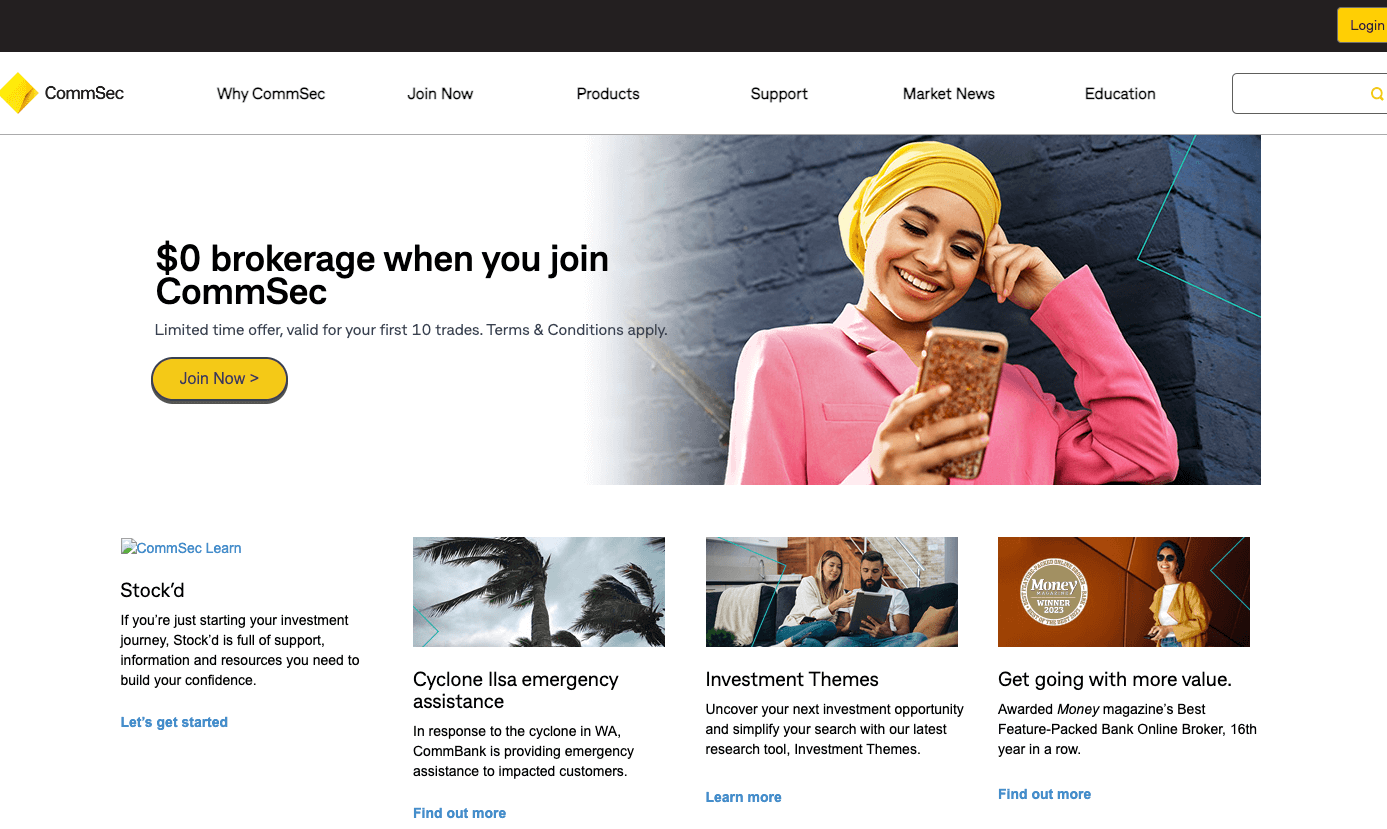
CommSec is an online broker available in Australia which is actually operated by a division of the Commonwealth Bank of Australia. This, as well as the platform’s longevity, has resulted in CommSec becoming one of the largest and most trusted online brokerages in Australia.
The platform itself gives users access to a wide range of global markets, such as the London Stock Exchange, the Australian Securities Exchange, and the Nasdaq.
As for its fee structure, CommSec will charge varying amounts depending on your trading volume:
- $10 for trades up to $1,000
- $19.95 for trades between $1,000 and $10,000
- $29.95 on trades between $10,000 and $25,000
- 0.12% fee on any trades over $25,000
While its trading fees may be relatively cheap, it’s important to note that the minimum deposit requirement when you first open an account with CommSec is $500. Also, you are charged $25 per annum for accounts that are inactive for more than a year.
MooMoo
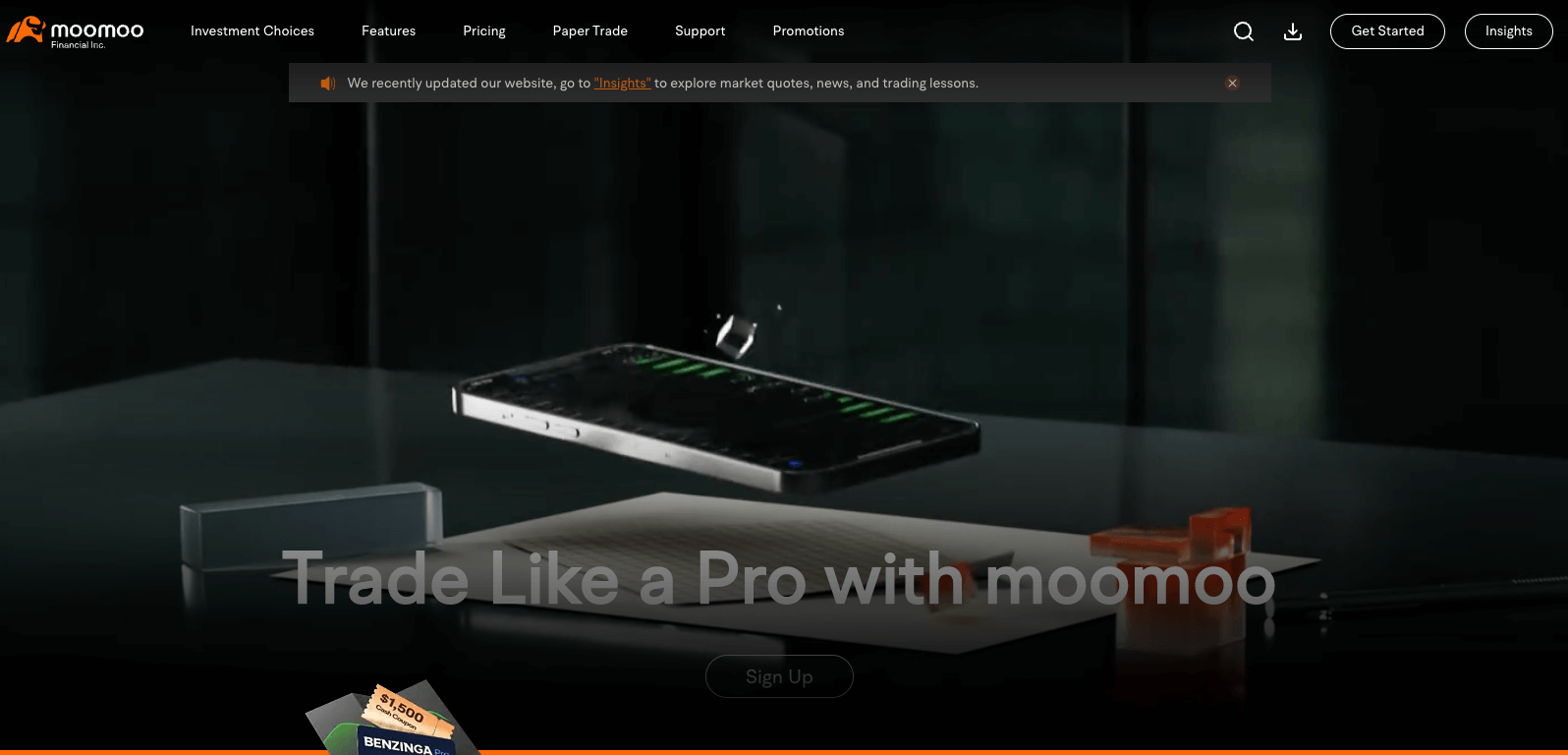
MooMoo is one of Australia’s first AI-powered stock trading platforms. This means that algorithms used by the platform compare stocks and shares to their historical chart patterns to try and predict price trends.
One thing to note about MooMoo is its slightly limited offering of stock markets – you can typically only trade on Australian, US, and Hong Kong markets.
Even so, the securities available on the markets MooMoo does support are aplenty: there are over 2,200 stocks on the Australian Securities Exchange, more than 10,000 US stocks, and over 2,800 Hong Kong stocks and ETFs.
As for its fees, MooMoo typically charges $8.80 or 0.08% on trades, depending on which is larger. Though, one of the helpful things about this platform is its introductory deals – you are typically given 180 days of free trades when you first open an account.
There is no minimum deposit requirement and no inactivity fees when using MooMoo.
Nabtrade
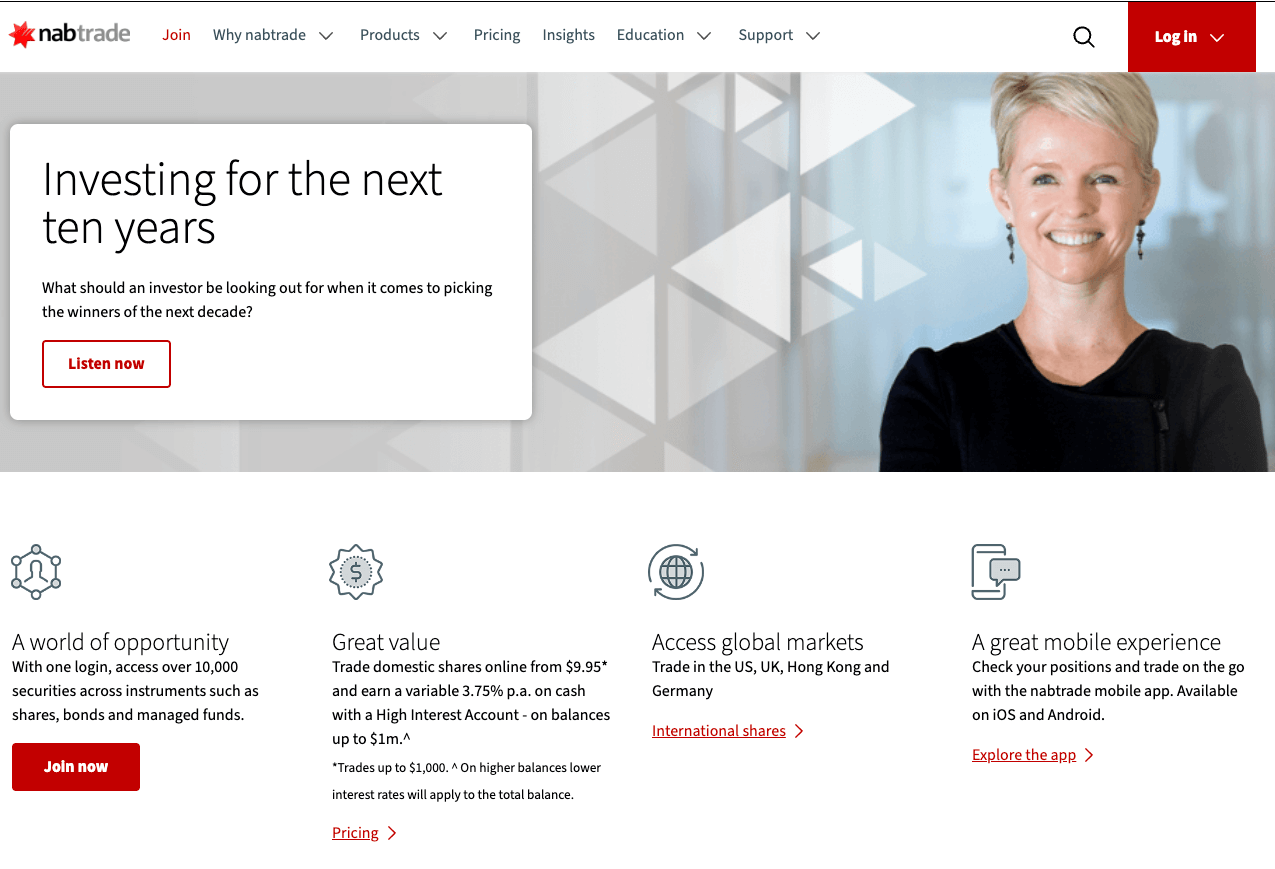
Another option for an online broker to use in Australia is Nabtrade. When you use this platform, you can access international markets in the US, UK, Hong Kong, Germany, and of course, Australia.
The fee structure on Nabtrade varies depending on the volume and price of your trades:
- $9.95 on trades up to $1,000
- $14.95 on trades up to $5,000
- $19.95 on trades between $5,000.01 and $20,000
- 0.11% on trades over $20,000.
One important thing to keep in mind with Nabtrade is its inactivity fees, as unlike most brokers on my list, it charges a percentage-based fee. Nabtrade will charge you a 0.5% fee on your portfolio if you don’t make any transactions within a year.
Also, when you make your first trade, there is a minimum investment requirement of $500.
Pearler
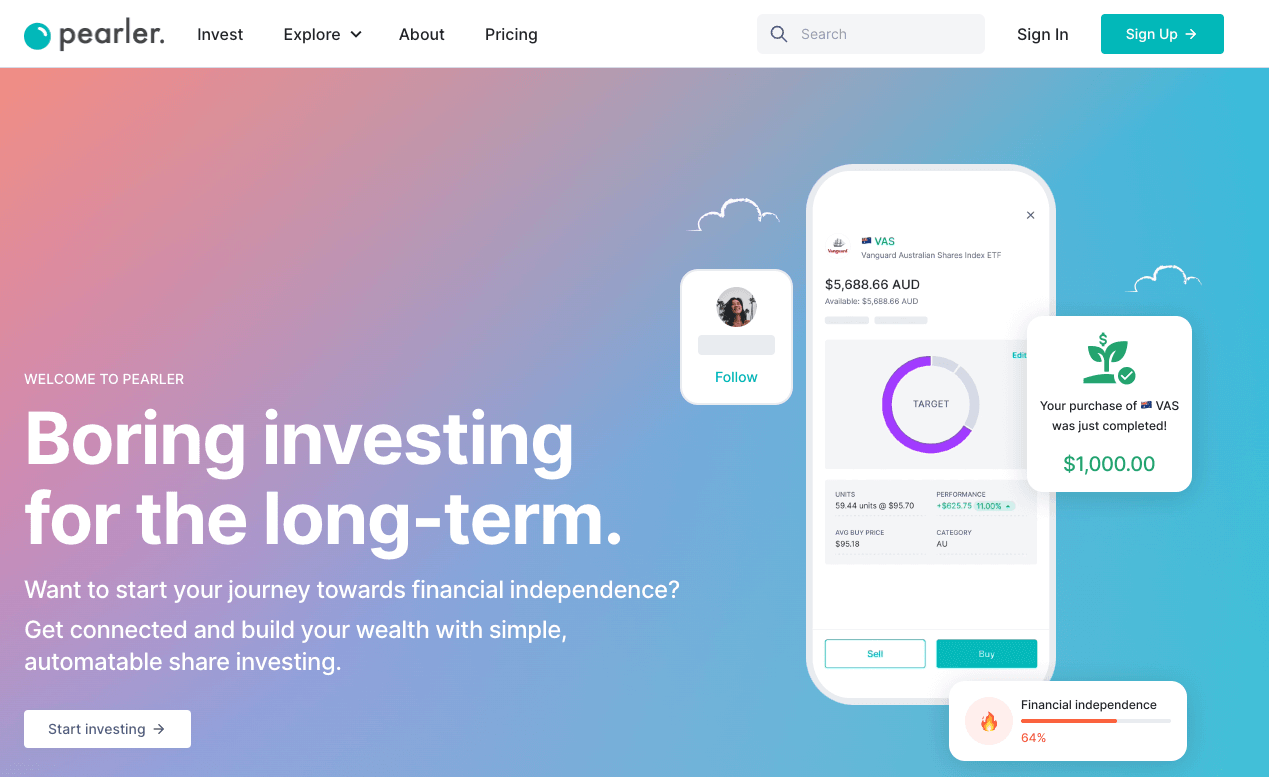
Yet another early entry to the Australian broker market is Pearler. Since Pearler offers users automated trading services, this broker focuses more on serving long-term ETF investors who wish to automate their investment strategy.
ETFs see zero brokerage fees on Pearler, making it useful for trading ETFs in large sums. You will typically be charged $6.50 on trades for stocks and shares.
Also, it’s important to note that you can only trade on Australian and US markets through Pearler.
There are absolutely no inactivity fees, or deposit and withdrawal charges. The only charges you will face with Pearler are trading costs.
Superhero
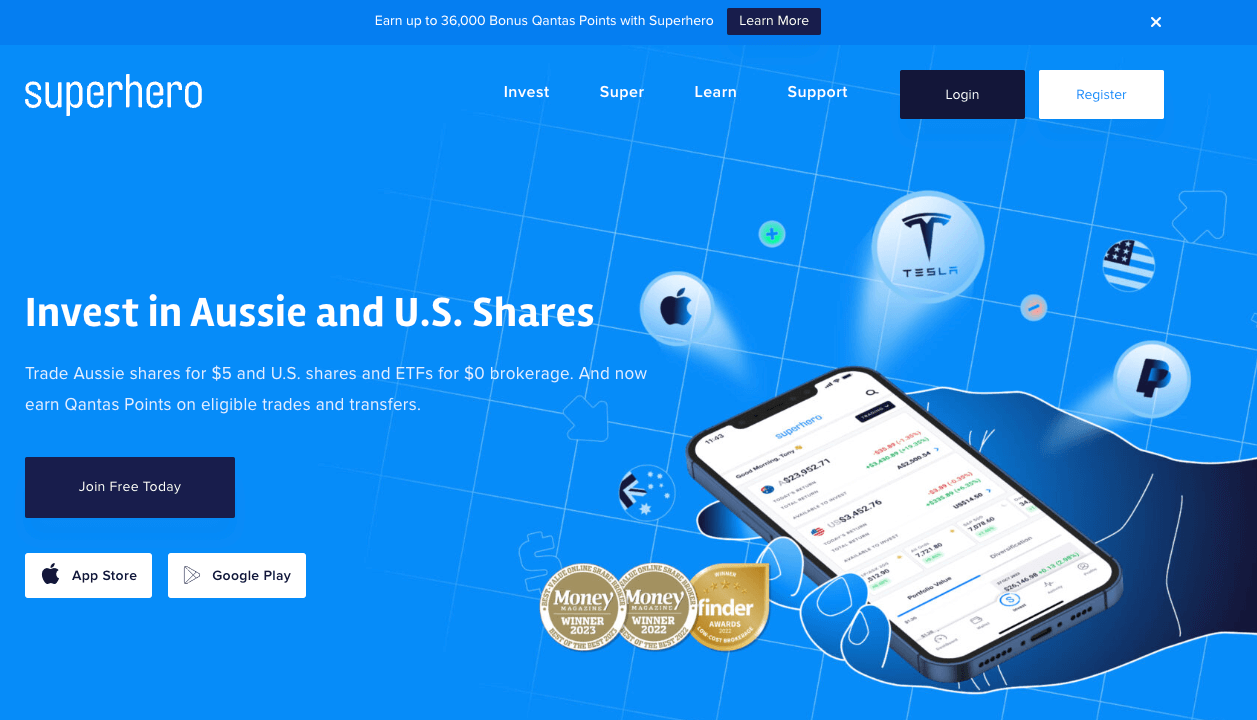
Superhero is a relatively new entry to the market. The main focus of Superhero is to get younger Australians more engaged with investing.
Superhero offers a wide choice of investments. Alongside stocks, shares, funds, and forex trading, the online broker also gives customers the chance to invest fractionally.
This is potentially helpful for younger investors who may have less money available to invest, but still want to purchase shares in their favourite companies.
The fees on Superhero, both trading and non-trading, are relatively competitive, too; there are no bank transfer fees and no withdrawal fees for Australian accounts. As for its trading fees, you will typically be charged a flat $5 fee on all trades, or no charge on ETF purchases.
Though, it’s worth keeping in mind that you will be required to deposit at least $100 when you first open an account with Superhero.
Selfwealth
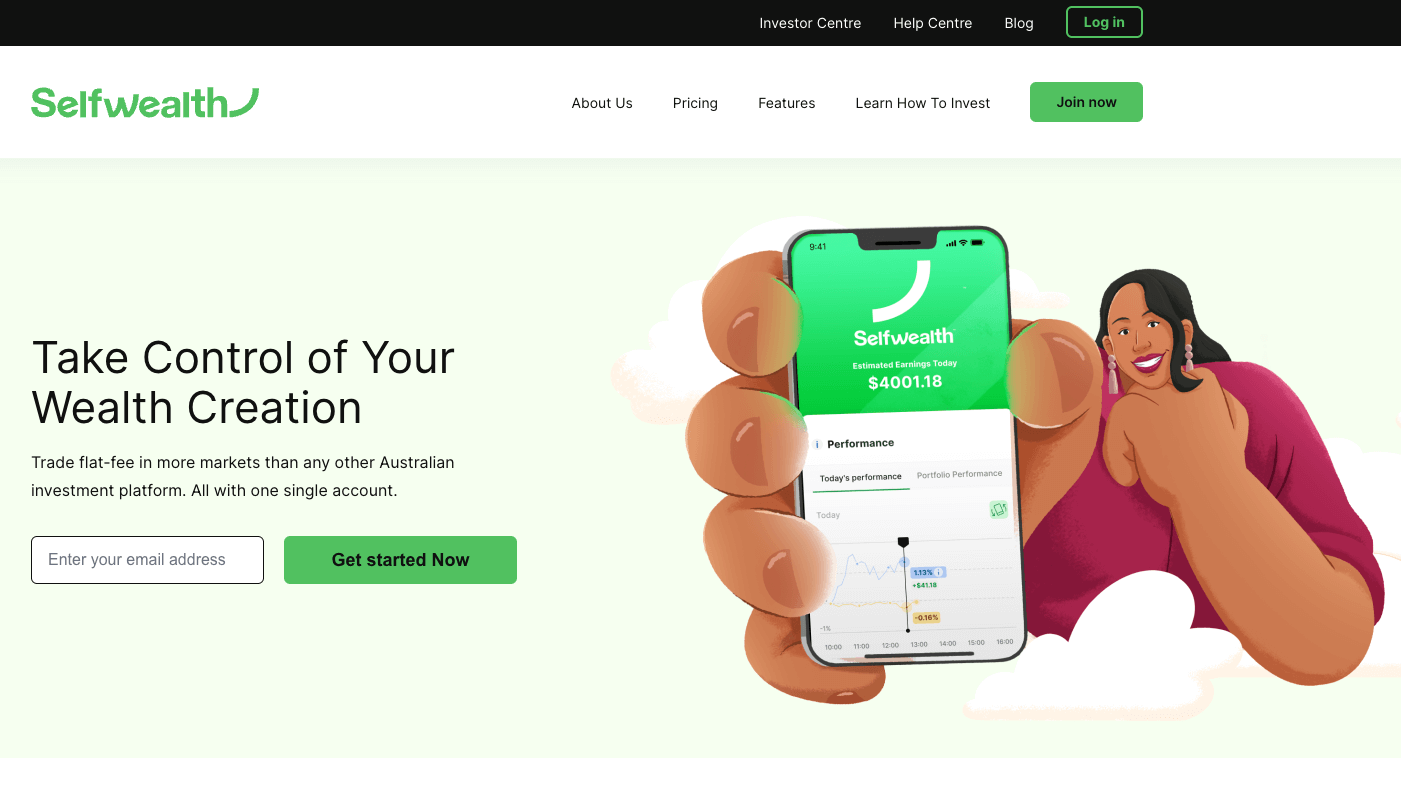
Selfwealth is an Australian-based broker founded in 2011. This broker is known for its low costs – you typically won’t pay any commission when you trade shares through Selfwealth, though you usually face a $9.50 fixed trading fee.
There are no inactivity fees on Selfwealth, though when you first open an account with the broker, you will be required to make a minimum deposit of $500.
As for its range of markets and securities on offer, you can typically only trade on US and Hong Kong markets.
Which Australian broker is the best?
Technically, there is no “best” share trading platform, as each has its own benefits and downsides, and some platforms will suit you better than others.
For example, if you’re still new to investing, you may want to consider using a platform that is intuitive and easy to use, such as Saxo.
Or, if you’re planning on trading large volumes of shares, you may want to use a broker with low or flat trading fees. This way, your potential profits won’t be diminished by excessive trading fees.
Similarly, if you aren’t an active trader and don’t think you’ll use your brokerage account on a regular basis, a broker without an inactivity fee, such as Selfwealth or MooMoo, may be more suitable for you.
Which Australian broker is best for beginners?
If you’re still a beginner, it may be worth opening an account with online share trading platforms that are straightforward and intuitive. For instance, Saxo’s next-generation trading platform is reportedly very easy to understand, which could make it ideal for beginners.
You may find that some platforms also offer in-built analysis and educational resources you can use to improve your investing skill while you trade. CMC Invest, for example, gives users access to advanced trading tools that aim to make investing easier overall.
Brokerage fees you should keep an eye out for
As previously mentioned, there are often several different brokerage fees you should be wary of when choosing a trading account.
Inactivity fees are charged when you don’t use your account for a certain period of time. Meanwhile, some brokers may charge you for making deposits or withdrawals to and from your bank account.
Most importantly, trading fees are typically charged when you buy and sell securities, and different brokers will charge you for trading in different ways. For example, some brokers, such as Selfwealth, will charge you a flat fee regardless of the volume of your trade, while others might charge a tiered fee that varies depending on how large your trade is.
In the case of eToro, you’ll face no trading fees when investing in stocks, shares, and funds.
What is the cheapest Australian broker?
Much like there isn’t a definitive best share trading platform, there technically isn’t a cheapest trading platform either, as it will depend on how much you trade, and the securities you invest in.
For instance, Selfwealth’s $9.50 flat brokerage fee may seem relatively cheap and would be fairly cost-efficient if you trade large volumes of shares. Though, if you end up trading lower volumes, this flat fee could quickly build up, making a percentage fee preferable.
Trading on Australian markets: everything you need to know
Now that you’ve decided on the best broker for you, you’re finally ready to start investing. Though, what are the different types of asset classes you can invest in? And how are you taxed on your investments?
Continue reading my guide to find out everything you need to know before you start investing.
What securities can you trade with Australian brokers?
While you may think investing is buying and selling shares in companies, you may be surprised to learn that there are several different ways you can invest your wealth.
Read on to learn the different types of securities on offer so you can decide which you’d like to invest in.
Stocks and shares
When you first think of investing, stocks and shares are likely the first thing that come to mind.
A company will typically issue stocks in order to raise capital to operate their business and fund any proposed projects.
Then, when you buy one of these shares from the stock market, you technically own a very small percentage of that company.
When you own shares, you can sit on them and wait for the price to rise, then sell them for a profit. Or, if you would prefer to invest for an income, you can rely on the regular payments that companies pay investors for holding shares, which are called “dividends”.
It’s important to note that not all companies offer dividend payments, so if your investment goals are to invest for an income, you should first ensure your desired company offers dividends.
While stocks and shares can be sold relatively quickly, it’s sometimes best to take a long-term approach with them.
Funds
Meanwhile, funds are a type of pooled investment that include a specific set of instruments or securities.
Instead of investing in an individual company through stocks and shares, funds instead give you instant diversification to a number of different securities. This is because you’re essentially giving your money to a fund manager, who then invests your money accordingly.
Then, if the fund manager’s investments perform well, the value of the fund will typically rise. This means you can either sell your stake in a fund for a profit when its value appreciates, or rely on dividend payments from the fund if it offers them.
You may find that you need to pay a management fee when you invest in funds. This is a charge to compensate the work of any fund managers making investment decisions.
A helpful feature of funds is the level of diversification you receive from a single investment, giving you access to multiple assets in a single purchase.
Some examples of funds include:
- Index-linked funds
- Exchange-traded funds (ETFs)
- Mutual funds
- Forex
Forex, or the “foreign exchange market”, is the global marketplace that allows investors to exchange different currencies.
When you trade forex, you will typically see that many currencies are linked together. These are called currency pairs, and they are usually divided between major pairs, which are more commonly traded currencies, while minor pairs are lesser traded currencies.
For example, major currency pairs would include USD/GBP or USD/EUR. Meanwhile, minor pairs would include AUS/GBP or AUS/EUR.
The difference in price between two currencies is called the “spread”, and you may find that many brokers will build trading fees into these spreads.
Unlike the Australian stock exchange, the foreign exchange market is open 24 hours a day, seven days a week.
Derivatives
Finally, derivatives essentially give you the chance to speculate on the performance of a particular security.
Two of the most commonly-traded forms of derivatives are “contracts for difference” (CFDs) and spread bets. With both spread betting and CFDs, you don’t actually own the underlying security, you’re just betting on its performance.
When you spread bet, you can decide to open either a long position – which predicts that a security will rise in value – or a short position – which predicts the security will fall in value.
For example, let’s say you opened a short position against Apple. You could “stake” $100 against every point of downward movement Apple’s shares take.
If Apple’s share price then fell by two points, you would earn $200. Conversely, if Apple’s share price rose by two points, you would instead lose $200.
Meanwhile, “contracts for difference”, or CFDs, work in a similar way, though you instead receive the difference in price from when you first opened a position to the close.
For example, if you purchased 100 long CFDs for Apple, and its share price at the time was $200, the total price of the position would be $20,000.
If Apple’s share price then rose to $250 a share, you would earn the difference between the opening price when you first opened your position, and the new price, which would be $50.
Then, this $50 would be multiplied by the number of contracts you own, which is 100 in this example, meaning you would net a total profit of $5,000. Of course, if it moved the other way, you could lose money.
As you can see, spread bets and CFDs are complex financial instruments. In fact, more than half of retail investor accounts lose money when spread betting or trading CFDs. For this reason, you may want to avoid them unless you know what you’re doing.
Which asset is the best to trade?
There is no “best” asset to trade, as this will depend on your tolerance for risk and your experience with investing.
For instance, if you’re still new to investing, you may want to consider securities which are easier to understand and typically less risky, such as funds or shares.
Or, if you are more experienced, and have a higher tolerance for risk, you could always try trading derivatives such as CFDs and spread bets.
How are you taxed when you invest in Australia?
In Australia, you’re typically taxed on your investment returns. As a result, you’re required to include any investment gains in your tax return. This includes:
- Interest
- Dividends
- Rent
- Managed fund distributions
- Capital gains from crypto, shares, or property.
Then, you’ll typically pay tax on your investment income based on your marginal rate of Income Tax. The rates of resident taxation in 2022-23 in Australia are:
|
Income |
Tax charge |
|
$0 – $18,200 |
No tax |
|
$18,201 – $45,000 |
19 cents for each $1 over $18,200 |
|
$45,001 – $120,000 |
$5,092, plus 32.5 cents for each $1 over $45,000 |
|
$120,001 – $180,000 |
$29,467, plus 37 cents for each $1 over $120,000 |
|
$180,001 or more |
$51,667, plus 45 cents for each $1 over $180,000 |
It’s important to keep in mind that, from 1 July 2024, the 37% marginal tax rate for those earning more than $120,000, and the 35% rate for those earning between $45,000 and $200,000, will be scrapped completely.
Instead, they will be replaced with a 30% rate for everything between $45,000 and $200,000. Then, anything above $200,000 will remain at the original 45% rate.
If you then sell an investment for more than the cost to purchase it, you’ve made a “capital gain”, which needs to be included in your tax return the same year you sold the investment. You’ll pay Income Tax on these amounts. While this is referred to as “Capital Gains Tax”, it is just part of your Income Tax, not a separate tax.
Though, if you’ve held an investment for more than a year, you’re only taxed on half of the capital gain. This is called the “Capital Gains Tax discount”.
Which Australian companies are best to invest in?
Again, the “best” company to invest in all depends on your reasons for investing and your tolerance for risk.
For example, if you want to invest for growth, it may be worth investing in a company that can be volatile, but could grow in value at some point. Conversely, more established companies may offer a more stable investment and be less volatile, but it could be less likely to rise in value.
These sorts of investments are often preferred for earning a passive income through dividends and long-term investing – hence the name, “investing for income”.
If you do wish to trade Australian stocks, some of the largest companies you can invest in include:
- Lifestyle Communities
- Altium
- Wisetech Global
- Sonic Healthcare
- Amcor
Of course, you could always invest in an index fund. These track the performance of some of the largest companies in Australia by market capitalization, meaning you can get exposure to some of the biggest companies in the country with a single investment.
Some of the largest Australian index funds include:
- Vanguard Australian Shares Index ETF
- iShares Core S&P/ASX 200 ETF
- VanEck Vectors Australian Equal Weight ETF
Australian brokers FAQs
The following frequently asked questions about Australian brokers and platforms answered:
What is the largest trading platform in Australia?
The largest trading platform in Australia is CommSec, largely popular due to its two-day settlement. This ensures money is in your account two days after your trade date. This platform also attracts a lot of beginners seeking live stocks and updates on the most popular stocks in Australia.
Am I taxed when I invest through Australian brokers?
Yes, you typically will be taxed on investment gains made in your trading accounts. This amount of tax you pay is usually based on your marginal rate of taxation.
You will likely face Capital Gains Tax (charged as Income Tax) when you sell your investment for more than you bought it for, though you are entitled to a tax reduction if you’ve held your investment for a year or longer.
Advertiser Disclosure
We may receive compensation from our partners for placement of their products or services, which helps to maintain our writing and research team. We may also receive compensation if you click on certain links posted on this article. While compensation arrangements may affect the order, position or placement of product information, it doesn’t influence our assessment of those products.

